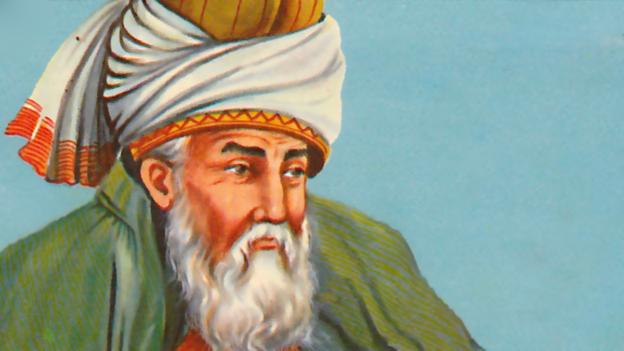Years ago I was in touch with a well-produced cultural magazine in Saudi Arabia. But as soon as they heard that I’d like to submit articles on Rumi, they said they couldn’t mention Rumi in Saudi Arabia because he is considered blasphemous and his poetry is not allowed there.
Rumi, like all true masters of the art of self-realization, was totally original. He was insanely gifted both creatively and mystically, in addition, he was wealthy, socially and culturally influential, had massive political power and was the most famous personality in the region during his lifetime and beyond.
Although historically (and still today) in the Middle East the clerics (or mullahs) would immediately execute blasphemous people however no cleric dared to censor Rumi’s work. So the result is not just one or two lines but hundreds of Rumi poems that are openly anti-religion and pro-self-empowerment.
Two such blasphemous poems are below.
(1) I have lost myself in God, and now God is mine. Don’t look for Him in every direction, for He is in my soul. I am the Sultan. I would be lying.
If I said that there is someone who is my sultan.
(2) This is you, making me drunk in a monastery. Turning me into an idol worshiper while I am seated at Kaaba. I have no control in this game of good and bad.
Almost all his anti-religion poetry is from his first collection titled Divan-e Shams-e Tabrizi
Rumi’s brilliant mind mixed with his independent lifestyle gave him a unique sense of expression that is very rare in Mideast and is badly needed in today’s highly oppressive environment.
Rumi refers to the process of Soul Evolution as being cooked. The idea is just as meals can’t be ready to be consumed until they’re well cooked, a soul is not ready for ascension until it’s also cooked. The cooking of the soul refers to the maturity of the spirit which is achieved by life experiences but especially by learning of universal mysteries and the truth about the soul’s imprisonment on this planet.
In the ode ‘I Have Come to Shine’, Rumi talks about ascension in this way:
“From the dust of the earth to a human being, there are a thousand steps.
I have been with you through these steps; I have held your hand and walked by your side. And I will be with you as you move beyond this human form and soar to the highest heavens.”
The process of Soul Evolution is about the maturity of the soul and its readiness for ascension off this dark planet.
Rumi of course routinely exclaimed proudly how the pain of love was exclusive to him. Rumi says: “Love is best when mixed with anguish. In our town, we won’t call you a Lover if you escape the pain.”
Excerpted from ‘Rumi’s Untold Story’ by Shahram Shiva. The 812th birth anniversary of Jalal ad-Din Muhammad Rumi is being observed on September 30.







